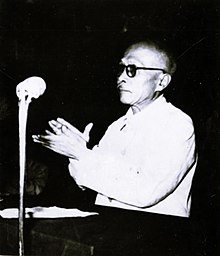Tôn Đức Thắng
| Tôn Đức Thắng | |
|---|---|
 |
|
| 2nd President of Vietnam | |
|
In office 2 July 1976 – 30 March 1980 |
|
| Preceded by | Nguyen Huu Tho (as Head of State of Republic of South Vietnam) |
| Succeeded by |
Trường Chinh Nguyễn Hữu Thọ (acting) |
| President of North Vietnam | |
|
In office 3 September 1969 – 2 July 1976 |
|
| Preceded by | Ho Chi Minh |
| Succeeded by | Post abolished |
| Chairman of the National Assembly | |
|
In office 20 September 1955 – 15 July 1960 |
|
| Preceded by | Bui Dang Doan |
| Succeeded by | Truong Chinh |
| Personal details | |
| Born |
August 20, 1888 Long Xuyên, French Indochina |
| Died | March 30, 1980 (aged 91) Hanoi, Vietnam |
| Political party | Communist Party of Vietnam |
| Spouse(s) | Doan Thi Dau |
| Awards |
|
| Tôn Đức Thắng | |
|---|---|
| Born | August 20, 1888 Long Xuyên, Vietnam |
| Died | March 30, 1980 Hanoi, Vietnam |
| Organization | Fatherland Front |
| Movement | Viet Minh |
Tôn Đức Thắng (August 20, 1888 – March 30, 1980) was the second and final president of North Vietnam and the first president of the Socialist Republic of Vietnam under the rule of Lê Duẩn. The position of president is ceremonial and Thắng was never a major policymaker or even a member of the Politburo, Vietnam's ruling council. He served as president, initially of North Vietnam from September 2, 1969, and later of a united Vietnam, until his death in 1980. He was a key Vietnamese nationalist and Communist political figure, was chairman of the National Assembly's Standing Committee 1955–1960 and served as the vice president to Hồ Chí Minh from 1960 to 1969. At the time of death at age 91, he was the oldest head of a state with the title "president" (subsequently surpassed by Hastings Banda).
Thắng was born to Tôn Văn Đề and Nguyễn Thị Di on Ông Hô Island along the Mekong River, roughly four kilometres from Long Xuyên, the capital of An Giang Province . From 1897 to 1901, Thắng received his education in Chinese script, history and philosophy from a private tutor in Long Xuyên. This tutor, an anti-colonialist, carried a heavy influence on the early development of Thắng’s political beliefs . Afterwards, he learned French at an elementary school in Long Xuyên. Thắng lived with his parents until 1906, when he moved to Saigon.
In 1919, in the Black Sea when he was with the French Navy, Thắng claimed to participate in a plot with fellow sailors to turn over the French armored cruiser Waldeck-Rousseau to the enemy Bolshevik revolutionaries. He continued to participate in rebellious activities against the French, was member of Vietnamese Revolutionary Youth Association since 1927; and in 1929, he was imprisoned by the French at Sai Gon, deported to Côn Sơn Prison. He remained there until 1945 and immediately rose again into the public eye. After Hồ Chí Minh’s Viet Minh came into power in August 1945, Thắng became the member Cochinchina Party Committee of CPV, member Administration Resistance Committee of Cochinchina and since 1946, the presiding member of the National Assembly. In 1947, he became a member of the Central Committee of the Communist Party of Vietnam.
...
Wikipedia
